181 Search Results for asha
May 31, 2013
by Carole Zangari -
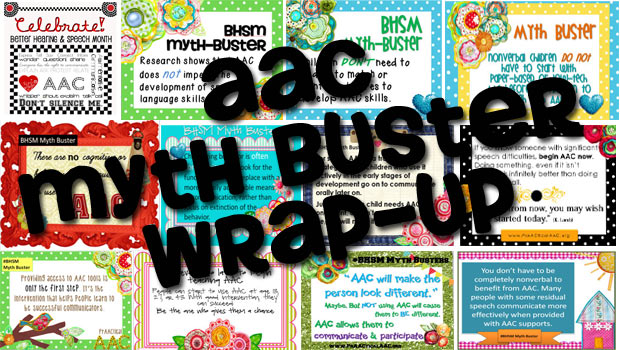
It stings to write this, but the truth is that in our country, students studying to become SLPs can graduate with little to no experience in AAC. While we’ve made some progress in getting more AAC into university SLP programs here in the US, we’ve really only scratched the surface. Given that a great many graduate without sufficient AAC knowledge, ASHA’s 2013 Better Speech and Hearing Month seemed like a perfect time to reach out to people who are relatively new in the field. I’m fairly certain that Dr. Lyle Lloyd, my doctoral advisor at Purdue University, was the first to talk about the mythology surrounding AAC, but many have followed that tradition. In a perfect world, we would have pre-planned our own myth busters and released them with pizazz in some sort of ordered fashion. But there was therapy to provide, student SLPs to teach, parents to talk to,... [Read More...]
May 28, 2013
by Robin Parker -
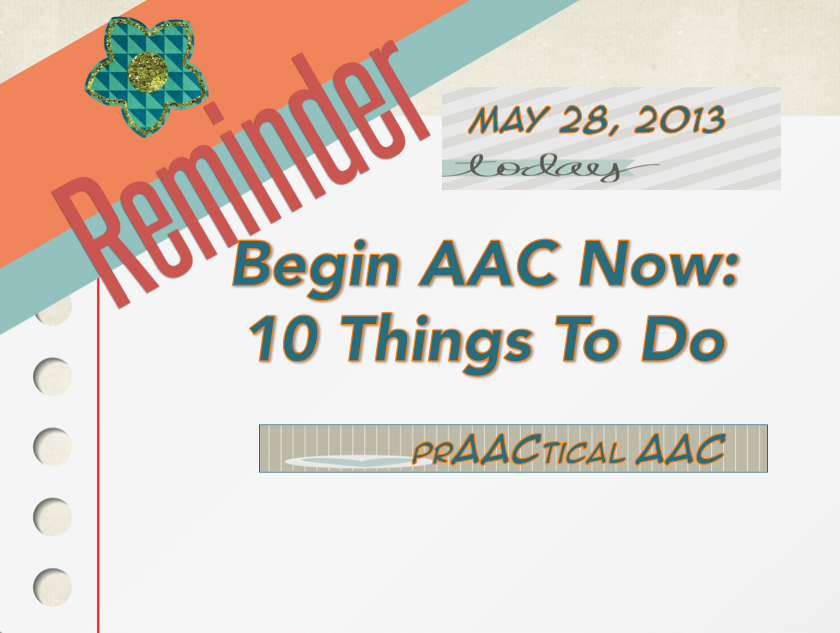
If you know someone with significant speech difficulties, BEGIN AAC NOW…. If you know someone, try something… Doing something, even if it isn’t perfect, is infinitely better than doing nothing at all…. There is no specific order for these suggestions, try what is appropriate and doable for you… A year from now you may wish you started today (K. Lamb)… So begin now at any level.. for someone, a class, a clinic, for a few… Create a Visual Language & AAC Environment: Visual Immersion Program, Meaningful Language Experiences, Importance of Using Visual Supports Speak AAC to the AAC Learner: Use Aided Language Input (ALI), Learning to Use ALI Get Assessment Information: Communication Matrix , AAC Evaluation Genie, Thoughts & Ideas, AAC Assessment Forms, Write & Implement Some AAC Goals: Goals That Matter, AAC in the IEP by Lauren Enders, PrAActical Goals Learn and Use a Core Word Approach: Core Word Communication Board Samples, About Core Words- First... [Read More...]
May 25, 2013
by Robin Parker -
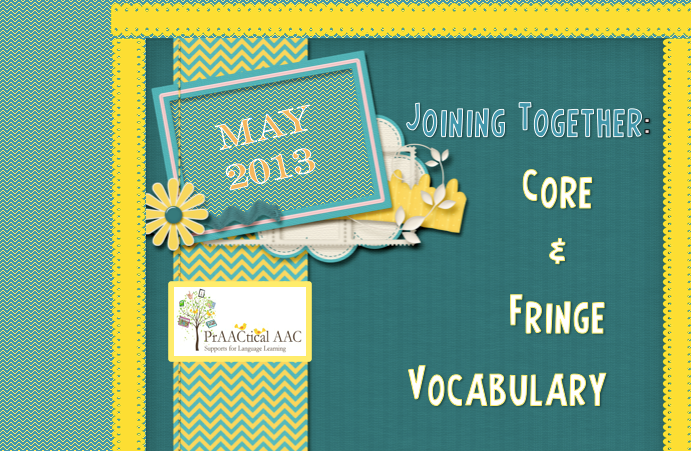
Last month we talked about Core Words, and we shared core word samples, philosophies, and resources. As we have moved into May’s Strategy of the Month, Communication Boards, we now want to share ideas about joining core and fringe words together on communication boards. Core vocabulary are those words used with high frequency and make up about 75-80% of the words we use everyday. Core vocabulary should be a main part of all AAC systems because it allows for most flexibility across most situations. With an emphasis on core words, we also use Fringe Vocabulary 20-25% of the time. Fringe vocabulary are used in a continuum of low-frequency to lower frequency situations (e.g., ‘mountain’: ‘glacier’, ‘crevasse’). Personal vocabulary can also be included under fringe vocabulary and would relate to personal words someone might need for their individual needs, interests, work, school, or even community. So, in the best communication world, AAC users would have access... [Read More...]
May 12, 2013
by Carole Zangari -
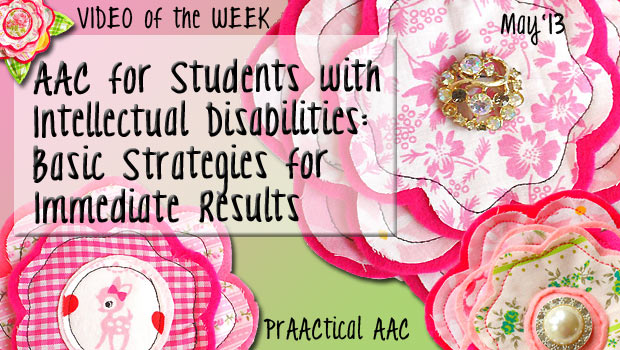
A good number of SLPs in school settings serve students with intellectual disabilities, some of whom who use or need AAC. In this video by ASHA, Dr. Krista Wilkinson and Ellen Kravitz of Easter Seals in Massachusetts, discusses many prAACtical issues that arise in doing this work. A number of years ago when I was the Coordinator for the ASHA Special Interest Division on AAC, I had the opportunity to work with a team of SLPs who were fully committed to educating SLPs about AAC. Ellen spearheaded the effort to create this webinar, along with the support of Diane Paul, Karen Niles, and many other wonderful people at the ASHA National Office. We were delighted to host ASHA’s media team at our university SLP clinic to do some of the taping for this program. Thanks to the generosity of ASHA and ASHF, this presentation is offered both in the free version and... [Read More...]
May 6, 2013
by Carole Zangari -
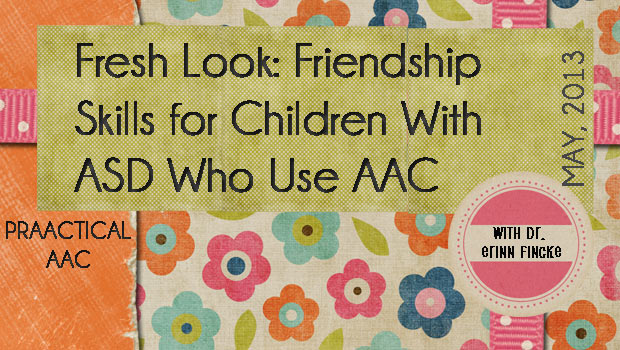
As we’ve said before on this blog, SLPs have great potential to make a difference in the social experiences of people who use AAC by supporting the development of friendships. ASHA’s Better Speech and Hearing Month (#BHSM) gives us a great opportunity to spread awareness that this is an area in which SLPs can make a tremendous difference. We’re so excited to share this Fresh Look post by Dr. Erinn Finke, Assistant Professor of Communication Sciences and Disorders at Penn State University. I was recently lucky enough to find myself in conversation with Pat Mirenda, a top researcher in the field of AAC and Autism Spectrum Disorders (ASD). In trying to decide what we really “know” about effective AAC strategies for children with ASD, we decided that while there is a lot of research regarding how to use AAC to teach children with ASD to request things, there really is not... [Read More...]
May 1, 2013
by Carole Zangari -
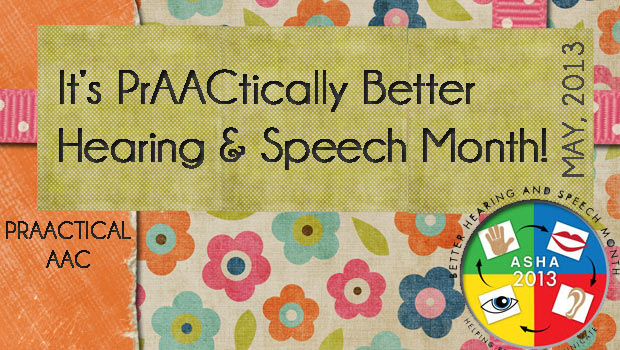
We’re celebrating ASHA’s Better Speech and Hearing Month with a series of posts for SLPs who are working with people who have significant communication difficulties and aren’t currently using AAC strategies. In these posts, we hope to give clinicians a fresh look and some prAACtical ideas about using AAC with a variety of clinical populations. We’ve invited well-respected authors, researchers, and clinicians to contribute to this series. We’re proud to kick-off a new series called Fresh Look with posts on using AAC with children and adults. Watch for posts on on a variety of topics, including: Using AAC to support people with dementia by Dr. Melanie Fried-Oken AAC in General Education with Dr. Joan Bruno Supporting the friendships of children with ASD by Dr. Erinn Fincke Providing initial AAC supports to people with ALS by Lisa Bardach Language therapy with children who use AAC by Drs. Cathy Binger and Jennifer... [Read More...]
April 22, 2013
by Robin Parker -
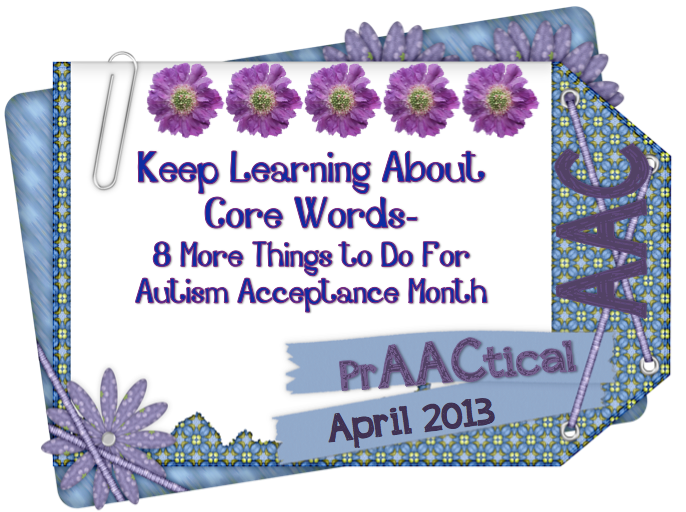
April is Autism Awareness/Acceptance month. It is exciting that there have been so many positive messages and activities around schools, communities, the country, and even the world. It has been great that AAC and visual supports have been incorporated into many educational and communication programs (hopefully soon a ‘tipping point’, so that ALL students who need AAC systems will have them). One of the next ‘tipping points’ that would also be great to see is with the use of core words on communication displays. ‘Core Words’ are our Strategy of the Month and we are writing about the first 12 through the first 36. But, if you want more background information or to go well beyond 36 core words (which is the goal), Here are 8 More Things To Do For Autism Acceptance Month: Take a look at AAC Language Lab for Core Word Information Read ASHA- A Few Good... [Read More...]
April 5, 2013
by Robin Parker -
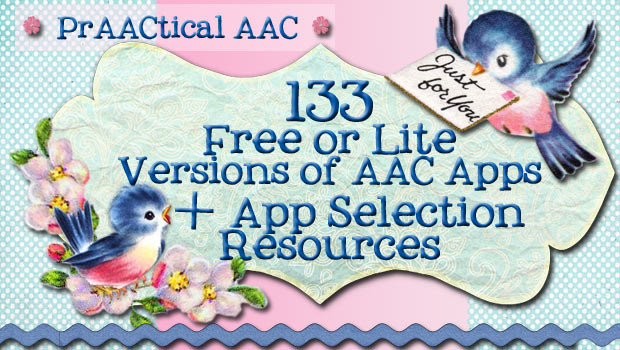
Here is our most recent update of free and lite versions of AAC apps for iOS and Android platform devices + a variety of resources related to AAC app selection. We strongly continue to advocate for a systematic process for AAC app selection. We recommend AAC app decision making in the context of a feature match process that gives appropriate attention to the full range of AAC options. Tools to Use In Making Decisions About AAC Apps Feature match form developed by Jessica Gosnell at Boston Children’s Hospital Feature match checklist created by Scott Marfilius and Kelly Fonner Our supplemental rubric covering language and communication features, RELAAACs Places to Go to Find AAC Apps and Reviews Comprehensive AAC app list for iPhone and iPad by Jane Farrall AAC Tech Connect’s Apps Assistant OCALI’s listing of apps for individuals with ASD Tech in Special Education Aidis Trust Communication App Reviews Training... [Read More...]
April 3, 2013
by Robin Parker -
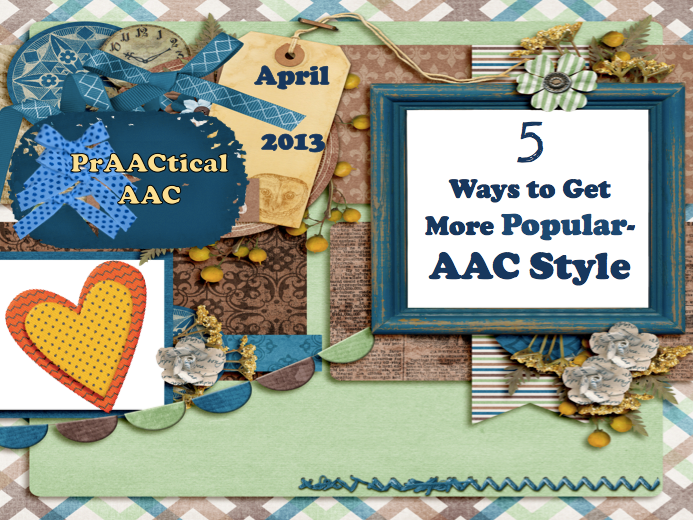
Popularity may or may not be important to children or adults, but most of us would like to have some friends and at least some people we can share information with. From a facilitator’s point of view, we need AAC users to have conversations with a variety of people. The more prAACtice in conversational exchanges the better. We have learned (through research and clinical experience) that if we teach specific skills, communication partners are more likely to initiate and respond to AAC communication. Here are things to teach for ‘conversational’ popularity 1. Teach Partner Focused Questions What’s up? How are you doing? How is your family? How are you feeling? What are you thinking? 2. Teach Social/Participation Scripts Attention Getters Starters Maintainers Turn Transfers Closings Let’s talk. Guess what? And next.. What’s your thoughts? That’s it. Come here. Let me tell you something. want a hint? Amazing right? See you later.... [Read More...]
April 1, 2013
by Robin Parker -
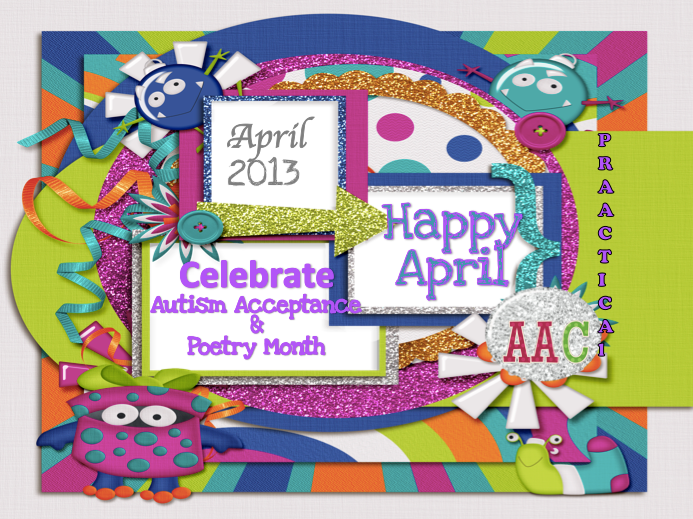
There are a lot of celebrations this month. It is officially Autism Awareness Month. A new name for this that has popped up & taken hold is Autism Acceptance Month. Awareness and/or Acceptance seems to mean different things to different people but hopefully the intent is similar. We hope that this month is filled with great ideas to support ALL people with autism and their families. We hope that educators, clinicians, and whole communities are inclusive, that they presume competence, and that they support communication and language using best prAACtice information and research. We do know that there is more to hope for than just this, like better employment outcomes, more appropriate accommodations, and more individualized support but if focus stays on the former, it seems then that the latter would improve. Plus we have more control (if there is such a thing) on facilitating inclusivity, presuming competence, and of course... [Read More...]









